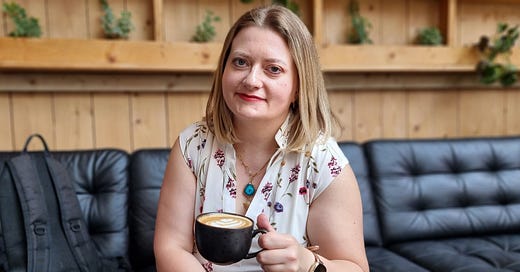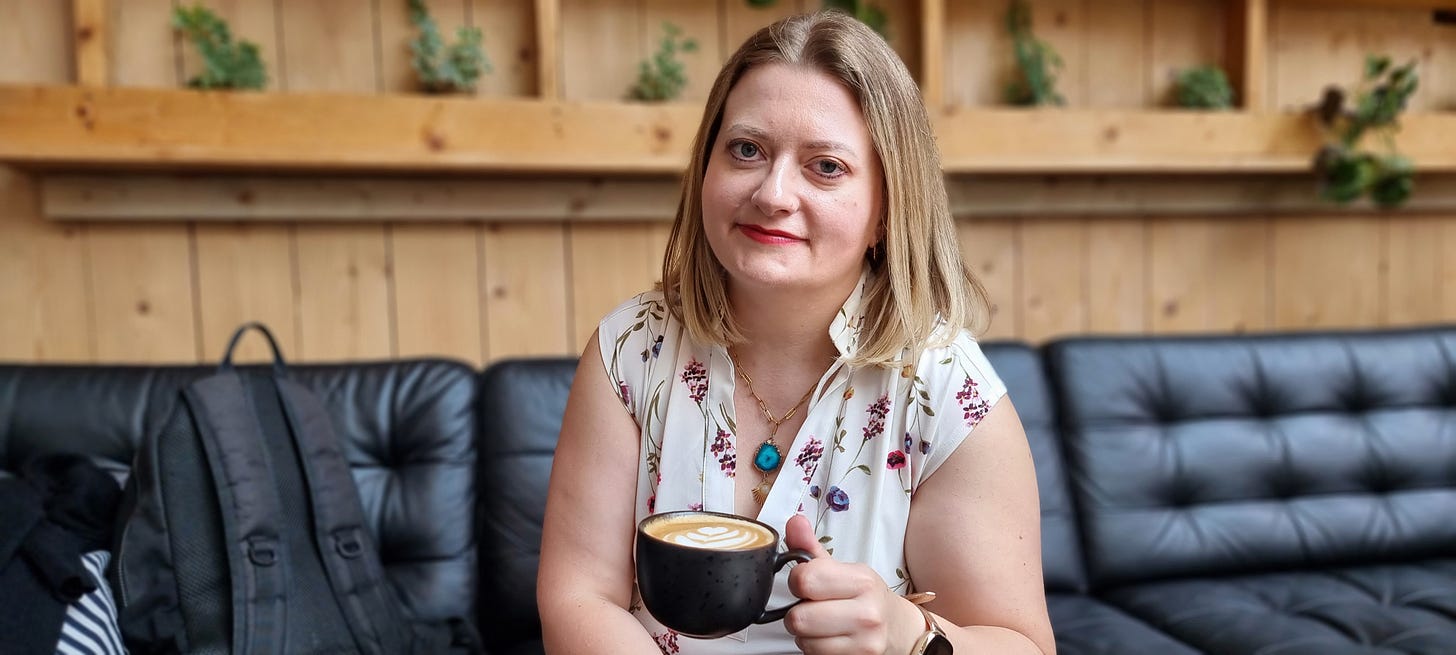My journey to becoming a Cognitive Behavioural Therapist (UK)
If you would like to become a therapist and looking for a career story, here is mine
Unfortunately every time I record a voiceover it cuts to 12 minutes long and compresses the audio - so I need to have a look into this, sorry I still sound like a chipmunk….
Hello, I’m Becky Grace Irwing. I write about women’s mental health, specifically binge eating disorder, eating disorders and systemic and power imbalances as causes of mental health difficulties. I’m a BABCP accredited CBT Therapist working privately and in the NHS with eating disorders. I help women with binge eating issues heal their relationship with food and their body. Please subscribe to support my work & to read more. You can also find me on Instagram, Tiktok, Facebook and LinkedIn. My website is Becky Grace Therapy.
I was recently asked to describe my career journey to becoming a BABCP accredited CBT Therapist. I hope you get something out of this story of someone who took this journey. This story includes an exhaustive list of jobs and qualifications I had prior to becoming a CBT Therapist, along with weird assumptions people make of you as a therapist and top tips for aspiring mental health or psychological professionals. It also intertwines my personal struggles within my career as I think lived experience is so important to my career journey, to inspire you and help you know I’m not something perfect human.
I’m based in the UK so all information is relevant to this country, specifically NHS England. I’m currently in private practice and have an NHS Band 7 Psychological Therapist role (which is the same banding role as a Clinical Psychologist & Counselling Psychologist) in Eating Disorders and work 30 hours per week and see 5 private clients weekly.
My career started with a degree in Biological Sciences in 2003 at University of East Anglia. It’s had very little use beyond the nutrition I learnt and the random trivia about cell biology and genetics that comes up on University Challenge quiz questions. I had no clue what I wanted to do after this degree, got in lots of debt (£23k) and failed to get a job in Norwich. I interviewed for about 30 jobs, didn’t get any of them, ran up credit card debt and had no idea how to manage my mood, emotions, money or career. I was riddled with high anxiety and struggled with painkiller addiction, binge eating disorder and struggling with IBS, stomach issues and just generally not coping. I struggled with speaking socially and in public so I had the bright idea to train as a Biology teacher - I worked out what graded exposure was before even knowing any mental health stuff!
Unfortunately, there were no appropriate university mental health support services at that time, I had undiagnosed ADHD and a mentor with no interpersonal skills who thought I just didn’t know my subject but what I really had was a struggle with confidence, self-doubt and sensory/verbal processing. The mentor never followed the correct processes for assessment, so no one had had a conversation with me to say that I was struggling before being told I was a ‘cause for concern’. I did an additional placement, again no one picked up my processing difficulties so I had to withdraw one week before the end of the PGCE or be failed on the course.
I tied all my self-worth with my external academic achievements as that is what I grew up knowing. It was the only thing I was usually good at and praised for (schools tend to perpetuate that). I felt a complete failure, it was the first time I had failed at something academically and it hit me hard. I didn’t know about academic appeals until it was too late and they threw my case out, as the ‘timeline was too long’ (think it was about 6 months after).
A chance conversation with a teaching colleague told me of a teaching agency who employed ‘instructors’ or unqualified teachers, or ‘cover supervisors’ and I started taking supply teaching work in the Norfolk and Suffolk area. I chanced upon a maternity cover post for 6 months teaching maths and science and being a Year 5 form tutor at Beccles Middle School. They were the most supportive, wonderful group of people to work with and they really believed in me and I flourished in that role and the young people were amazing. I do believe having people around you who support you and believe in you are crucial to success and is why I’m such a collaborator and ‘hype queen’ now. Unfortunately the contract wasn’t extended due to said maternity leave and I carried on with some more supply contracts for a while (about 3 years) before saying goodbye to teaching as I couldn’t reconcile not being qualified, yet being able to teach.
I took an NHS administration role as I had some Medical Secretary experience (nepotism being that I had provided some secretary cover for my Mum at a surgery, this is what privilege is). This was in an NHS adult community mental health team and I loved it and somehow decided I wanted to train to be a Mental Health Nurse. I took a slightly higher paying administration job at University of Cambridge but that turned out to be a bit of a dud job (poor management) and I was bored out of my brains surrounded by academics. I then applied for Mental Health Nursing on a whim in Birmingham and got in.
I trained to become a Registered Mental Health Nurse in 2013, training at Birmingham City University and leaving the safety of East Anglia behind. I simultaneously worked as a healthcare assistant too at this time but also a Group Fitness Instructor and Personal Trainer teaching predominantly Les Mills classes. I found the love of group fitness at the time everything was going wrong with teaching. I learnt how to regulate my emotions through these classes but also adopted a heap of diet culture, disordered eating and excessive exercise. I also trained to be a Level 3 Personal Trainer with nutrition and weight management.
Also as an aside, another motivation for my journey into mental health nursing came from a difficult experience where one of my closest friends murdered another close friend of mine, this was a deeply difficult experience but I wanted to understand systems and processes regarding mental health law, as I felt there were great injustices from my former friend not being sectioned just before the murder. A link to the most recent information on that is available here. I also understood once I was trained that it’s not a simple process at all and requires multiple steps to validly detain someone.
Non exhaustive list of jobs I’ve had pre-mental health nursing :)
Medical Secretary in a GP surgery
Waitress in bars/restaurants/events
Carer, cleaner and cook in a care home
Worked in retail at some point
Team administrator for an NHS Adult Community Mental Health Team
More administration for Cambridge University
Group Fitness instructor in gyms/leisure facilities from 2010 to 2020 in Norfolk, Cambridge, Bury St Edmunds, Newmarket and Birmingham (lots of it). Yoga Teacher from 2020.
Probably have forgotten some jobs cos ADHD and I don’t keep a CV beyond 10 years
Supply teaching in schools in Norfolk, Suffolk, Cambridgeshire and Birmingham (there were some really tough places - these were some of the best people skills I ever learnt)
Services I’ve worked in as a Mental Health Nurse
Birmingham based adult acute psychiatry and crisis services
Birmingham based CAMHS and Forensic CAMHS Services, bank shifts in Mother & Baby and other specialist placements
As a trainee nurse my placements were in adult acute, older adult acute, community mental health, rehab services and hospital based psychiatric liaison services all across Birmingham and surrounding areas
University wellbeing service as a Mental Health Advisor (and some Disability Adviser crossover) for 4 years - where equality, diversity, inclusion and accessibility became super important to me and I bang on about it ever since and I try to be as inclusive as possible in my practice. I would have multiple assessments per day and short-medium term case work with students per day, with incredibly complex presentations and global situations (seriously how do you manage psychiatric risk when someone is in Singapore…..short answer is you don’t). I also delivered low intensity CBT/DBT type skills workshops. It was also here that I realised I might have ADHD and got diagnosed in 2020 just before lockdown. I would be best suited with clients with complex presentations of BPD, ADHD, ASD, OCD etc and disability.
Services I’ve worked in as a Cognitive Behavioural Therapist
NHS Talking Therapies (IAPT) for a London based service
Currently resident CBT Therapist in an NHS eating disorders service
I haven’t explained how I got into CBT, but ultimately, I became stagnant in my university role, I wasn’t developing any further and there was nowhere for me to progress to. A chance special Covid cohort with King’s College London is how I got in. Obviously I got in on my own merit but it was a special chance to do a mostly online experience whilst living in Norwich and studying the Postgraduate Diploma in CBT with a prestigious university.
Weird assumptions people make of you when you become a Cognitive Behavioural Therapist
That you have a Psychology degree
That you follow a set path of psychology degree followed by Psychological Wellbeing Practitioner before training to be a CBT Therapist or Clinical Psychologist. I did not do this path and please don’t make assumptions. I’m also not a failed clinical psychologist and doing the doctorate is not on my radar because it would make zero difference in terms of NHS banding or pay.
When you become a therapist, they (therapy agencies, professionals and employers) assume you have no mental health experience prior and state you need ‘x years experience’ (usually 2) which leads to me having a discussion that research shows us the best people are usually the ones who have just qualified and haven’t adopted bad habits, along with outlining my core profession as a mental health nurse.
Top tips for aspiring psychology or mental health professionals
There is no one correct route to working in 1:1 therapy settings, you do you, or whatever route comes. I did not plan this route at all.
Please consider mental health nursing, social work or occupational therapy if you are unable to get on to the psychology doctorate. They are core professions, give you valuable coalface experience and put you in the thick of the toughest situations with people. They are so undervalued as professions.
Let me know what you thought of this post in the comments, anything you have learnt from it. I would consider offering mentoring or career coaching if anyone would find that helpful, so do let me know.







This is great Becky always find it interesting how people become CBT therapists. Thanks for sharing x